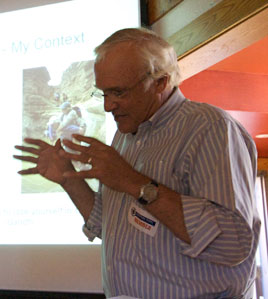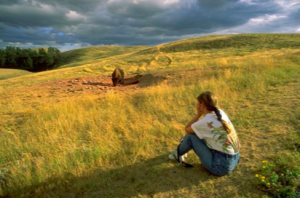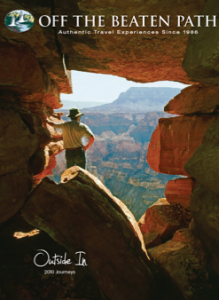
Editor's Note: Bill Bryan, a long-time advocate of the ATTA and a 2010 Adventure Travel World Summit Advisory Committee member, first contacted the ATTA about, "Championing the Soul of Travel" following the 2009 ATWS. Then in February 2010, Bill joined ATTA's President Shannon Stowell and Vice President Chris Doyle in Washington, D.C., to bring a voice to adventure tourism within the U.S. Department of Commerce's Office of Travel and Tourism Industries. Following those sessions, the three discussed the concept of the "soul" of travel. It's a concept that Bill presented at the ATTA's Montana Regional Meeting in June - a concept well received by attendees and that stimulated meaty discussion. Here, we solicit your comments to Bill's perspectives, and ask that you "sound off" so that we know your minds. Thanks in advance - we'll consider your perspectives, and we hope these combined perspectives will continue to help guide the ATTA and its members be the keepers of the soul of travel.
“Meet us off the beaten path, at the confluence of journey and destination, where the heart of the traveler meets the soul of the place.”
So begins the story line of the 2010 catalog of our company, Off the Beaten Path, as it goes about describing our program and services for the prospective traveler.
It also begins my reflection on travel—where it is today, what its place is in the future of our planet, its peoples and its cultures, and, what is really meant by “heart” and “soul” regarding travel. But in order to contemplate this, I first need to reexamine where I’ve been, who I am and what I want to do with my life going forward. And I need to think through why I’ve devoted the last twenty five years helping people plan their travel and all the while trying to go beyond their expectations --traveling with a purpose. I confess to a do-gooder background. I’ve always aspired to be an integral part of that portion of society that seeks change which furthers a more nurturing, equitable and sustainable world. That is why my doctoral thesis focused on social change theory, strategies and tactics some forty years ago. And it’s why the first fifteen years of my professional life were devoted to helping organize and develop cause-oriented entities so that they were able to prosper in their pursuit of realizing visions of a healthy, prosperous and just world.
I got into the travel business because it was a part of my region’s economic sector that seemed to be doing good for all involved. Yes, it fed on my service-oriented bias and my passion for pursuing a better world. And it allowed me to continue to do what I wanted to do and be what I want to be. Perhaps Gandhi said it best: “The best way to find yourself is to lose yourself in the service of others.”
It didn’t take long to begin to see that there is a very extractive side of travel – simply that travelers usually are getting far more than they are giving back. And it wasn’t hard to realize that was the way I had historically viewed my own travel. Whether it was on multi-day canoe trips on Michigan rivers or backcountry vacations in the wilderness of Idaho, there was always the underlying premise: How could I recreate and vacation in the outdoors as cheaply as possible? And never once was I really thinking about my environmental footprint, let alone the impact that I was having in local communities. Cheap adventure and nature-based experiences were my game and, in many ways, is “the American way”. Even today, that mentality is never far away.
Sustainability issues such as our environmental footprint and accountability to the communities in which we travel have only recently begun to enter into the minds of we suppliers and our travelers. For example, the concept of human carrying capacity in environmentally fragile areas, such as along many of our wild and scenic rivers and in the backcountry of many of our national parks, has only been seriously recognized in the last twenty to thirty years or less. And it is still not truly acknowledged in our overcrowded national parks that do not have the infrastructure, let alone the carrying capacity, to handle the numbers of people that they are experiencing today.
Let’s face it – historically, travel has been a high volume, low margin industry without much accountability to environment, community and cultures. In my part of the world – the Northern Rockies – industry success is often directly aligned with how well the national parks are doing numbers-wise. Yet parks like Glacier and Yellowstone don’t have a sustainable infrastructure nor are there many policies in place that identify human carrying capacity and plan for it. For example, little thought is being given to limiting how many people can enter the west entrance of Yellowstone on a given day in mid-summer, even though on many days the existing infrastructure and services in place just cannot sustainably handle the actual volume in an organized way.
Fortunately, there are many well intentioned efforts presently underway in the travel world, particularly in the adventure travel world, that are really looking at the various aspects and impacts of travel in a more accountable and sustainable manner. Progressive concepts such as nature-based tourism, ecotourism, geotourism, conscientious travel, sustainable travel, responsible travel and even adventure travel are increasingly becoming part of the lexicon and practices of a growing segment of the travel industry that sees the necessity of developing and implementing responsible practices regarding sustainability as an essential part of travel going forward.
 Today it is very encouraging to see more and more suppliers and travelers embracing the overarching concept of meaningful travel that has the intent of connecting the traveler with community, culture and environment. The genesis of such travel can be traced back to the Cold War era of the 1950’s, when President Eisenhower and Premier Khrushchev saw the importance of professionals and scientists in their respective countries immersing themselves in each other’s cultures so as to have a better understanding for one another through the historic People To People program which they had created. This program was the beginning of a variety of strategic solutions that eventually led to the end of the Cold War and the importance of mutual respect for different cultures and an enhanced appreciation of human diversity.
Today it is very encouraging to see more and more suppliers and travelers embracing the overarching concept of meaningful travel that has the intent of connecting the traveler with community, culture and environment. The genesis of such travel can be traced back to the Cold War era of the 1950’s, when President Eisenhower and Premier Khrushchev saw the importance of professionals and scientists in their respective countries immersing themselves in each other’s cultures so as to have a better understanding for one another through the historic People To People program which they had created. This program was the beginning of a variety of strategic solutions that eventually led to the end of the Cold War and the importance of mutual respect for different cultures and an enhanced appreciation of human diversity.
Today many travel suppliers in the adventure travel world have embraced well-intentioned efforts that focus on community and environmental accountability. Micato Safaris’ AmericaShare program (http://www.americashare.org/micatoguests.php ) is a good example, as is Lindblad’s Darwin Foundation in the Galapagos (www.darwinfoundation.org/english) with its ongoing commitment to taking world leaders to the Arctic aboard their ships so as to learn more about climate change and its long term impacts on the planet. Even we at Off the Beaten Path have placed a sizeable priority with our “Hands Can” program in sharing our expertise in sustainable travel and accompanying marketing philosophies with rural communities in the American West to help forge healthy and sustainable economic development in rural areas where we operate programs. There are also significant efforts amongst many adventure travel companies to promote the concept of travelers’ philanthropy and “volunteering” programs where they help travelers immerse themselves in specific regions of the world to help local communities in a variety of humanitarian and environmental ways.
While no doubt many adventure travel companies are truly committed to responsible travel practices, there still is a long way to go in getting the majority of their travelers to embrace responsible travel practices to the extent that they become a major factor in deciding what tour operator to choose when signing up for a particular group journey or custom travel program. But there’s little question that once traveling with a company that has responsible travel as a high priority, loyalty on the part of the traveler grows substantially.
An epiphany of sorts regarding a viable responsible travel agenda came to me at the Adventure Travel Trade Association’s World Summit in Quebec in October 2009, where 500+ members gathered. Within the adventure travel community at the Summit appeared to be a sincere connecting thread amongst attendees regarding the concept of adventure travel in the future. There was a genuine climate of agreement that seemed to evolve during the conference that adventure travel has a real purpose that needs to be further developed and embraced, nurtured and promoted. And, most importantly, attendees appeared to really want to be an integral part of such a segment of travel and accompanying social change. For example, quotes heard from attendees at the Quebec meeting included:
• “Adventure travel is a tool for learning and then acting.”
• “Travel may be the most important tool for positive change in the world.”
• “We in the adventure travel industry are on the front lines of sustainable and responsible tourism.”
• “There is a strong spirit of generosity in our travelers.”
• “We need to help our clients see that they are important agents of change.”
• “We are in the business of creating advocacy, sustainability, world understanding and peace.”
• “We need to help our clients develop the ability to experience, listen and then act.”
• “Adventure travel has to achieve the bottom line of success regarding people, planet and profit.”
As Mark Twain once said:
“Travel is fatal to prejudice, bigotry and narrow-mindedness and many of our people need it sorely on these accounts. Broad, wholesome, charitable views of men and things cannot be acquired by vegetating in one little corner of the Earth all one’s lifetime.”
 The Summit and what transpired there has helped me focus my personal and professional priorities regarding travel and the travel business going forward. It got me to think how might I best contribute to this emerging aspect of travel, and it certainly helped further my comfort level around my “giving back bias.” I decided then and there that it was important to help others in the travel business associate travel with meaning, a sense of doing good and all the transformational issues that come along with it.
The Summit and what transpired there has helped me focus my personal and professional priorities regarding travel and the travel business going forward. It got me to think how might I best contribute to this emerging aspect of travel, and it certainly helped further my comfort level around my “giving back bias.” I decided then and there that it was important to help others in the travel business associate travel with meaning, a sense of doing good and all the transformational issues that come along with it.
Certainly many of us have felt for some time that travel does promote personal transformation. We’re often finding one’s greatest inspirations in our inner world when we’re in the outside world. But this also begs the issue of social transformation. Once personally transformed, do we keep it within or do we begin to share it with others, whether it’s with family, friends, our community or even in a larger societal context? The answer is yes, we can and should share – personal transformation has to lead to social transformation. And travel can and should be all about personal and social transformation.
That’s what was resonating with people at the ATTA Summit in Quebec and I believe needs to be inculcated throughout the larger world of adventure travel.
On the other hand, we in the industry have been through tough times over the last few years. Many of us have worried about whether our own businesses will survive and have struggled greatly, often operating in survival mode. Given that, where do the laudatory efforts of responsible travel fit in difficult economic times? Is the ethos of responsible travel still a priority with those of us supplying adventure travel experiences in these difficult times? Are they ingrained enough in our operations so that we’re compromising our responsible travel standards? From my own anecdotal observations, it seems like we’re not quite there yet. It’s been all too easy to focus primarily on profit due to the necessity for survival, and often ignore the accountability issues of people and planet, or at least put them at a much lower priority. If this assessment is valid, it shows that we have a way to go in developing an infrastructure within the adventure travel industry that never allows the “soul” of travel to be compromised.
So what is the “soul” of travel? By definition, “soul” is the vital principle in humans embodying the faculties of thought, action and emotion; the central or integral part; the vital core; the moral and emotional nature of human beings. Frankly, this is what we as a people are all about and no doubt, certain types of travel can deepen the soul. But if this is an essential aspect of travel, there is a lot of work that needs to be done in developing a foundational infrastructure that nurtures corporate responsibility, where the basic responsible travel standards are not compromised even in hard times.
We know that our customers are searching for something other than a great deal on their vacation. They are looking to connect through meaningful experiences, as well as looking for value. They want to be a part of a traveling culture that seeks to better our society and our world. Our guests not only want to explore and discover but their quest for connection and meaning speaks to their search for both personal and social transformation that has them feeling good about their role in everyday life through efforts to bring about a sustainable, just and peaceful world.
Given that, we leaders in the adventure travel business need to be advocating an infrastructure that generates and nurtures a context for profit that includes people and planet in an appropriate and sustainable way.
If that’s the case, where does an entity like the Adventure Travel Trade Association fit? Better still, where do we, as leaders in this business, fit in building this infrastructure? How and where do we place a high priority in:
• Spreading the word?
• Sharing best practices?
• Fostering a long view and an intellectual base?
• Mission-oriented research (e.g. protecting coastal environments and cultures through sustainable travel practices)?
• Welcoming, educating and nurturing newcomers to our profession?
• Launching and implementing professional development programs?
• Developing and implementing standards and certification programs?
Should there be ATTA supported advocacy groups at a state, provincial and regional level that go beyond the travel fundamentals of promotion, trends and numbers, and also advocate for “the soul of travel” through furthering responsible and sustainable travel practices?
There is little doubt that we in the business need to attract smart people with a great entrepreneurial spirit; and that we need to encourage out-of-the-box thinking and great new ideas relating to meaningful travel. We also need to create the right environment for our colleagues, old and new, so that they can create, incubate and further such bright and innovative ideas that further the concepts of responsible and sustainable travel.
Can the adventure travel segment of the travel industry lead the way in this area? If not, then who? If so, then how? What’s our role in creating a professional and business environment that really views travel in a philosophical, political, sociological and ecological context and where entrepreneurialism is embraced and valued highly?
So there we are. In many ways, adventure travel is on the cusp of doing something really special: developing and championing the soul of travel. The perspective and environment was certainly there in Quebec. Now do we capitalize on this and take it to a new level? Is this what ATTA should be all about? Is it a priority that ATTA leaders identify and then go about incubating, creating, nurturing and developing in the years ahead? There is a lot here. It’s exciting. And I truly believe the time is now for us to move forward.
“How wonderful it is that nobody need wait a single moment
before starting to improve the world.”
(Anne Frank)
“Unless somebody like you cares a whole lot, nothing is going to get better. It’s not.”
(Dr. Seuss, “The Lorax”)
